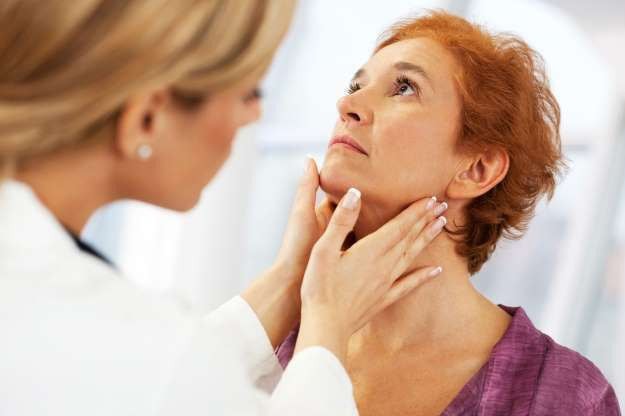15 health problems that women in their 40s should be aware of
Often by the age of 40 some women begin to develop deeper wrinkles and lines. The age of 40 also signals the importance of regular health check-ups.
Weight gain
Losing weight in your 20s can be as simple as giving up soda for a week, but as women age, it becomes harder to lose weight and easier to gain it. Age, lack of exercise, stress, and poor diet choices are the biggest factors that influence weight gain. Staying active is key.

Tired and lacking vitality
Feeling tired may not seem like a new thing for women in their 40s. After all, you may be working full-time, raising children, and managing a home, but as women age, they tend to tire more often and more quickly. This is largely due to the hormonal changes that come with menopause. Consistent sleep is a key factor in rejuvenating and restoring the body, so aim for seven hours of sleep five nights a week.
Cardiovascular disease
This is the most common cause of death in American women. Over time, plaque builds up in the arteries, causing them to narrow and stiffen. This blocks the normal flow of blood and oxygen that the heart needs. Blood clots can develop on the plaque, blocking blood flow to the heart, leading to a heart attack. This is another reason why diet and exercise are so important.
Reduced libido
There are many reasons why women in their 40s experience a decrease in sexual desire. Everything from hormonal changes to vaginal dryness can be the cause. Sometimes the solution can be as simple as using an estrogen cream, but in other cases, it can signal something more serious. Always talk to your doctor, no matter how serious the problem is or whether you don't think it's a problem.
Breast cancer
Breast cancer and cervical cancer are the two most common cancers that affect women. Breast cancer can occur at any age, but the risk increases with age. Cervical cancer can affect any woman who is or has been sexually active, but it occurs mainly in women who have HPV, are immunocompromised, are poorly nourished, and do not have Pap smears. Regular mammograms are important after age 40.
Insomnia
As if fatigue and lack of energy weren’t enough, insomnia is also a problem for many middle-aged women. In fact, a CDC study found that nearly 20% of women ages 40 to 59 reported having trouble sleeping four or more nights a week. For many, the study explained, this is due to the onset of menopause. Night sweats, hot flashes, and mood swings can all affect sleep.
Hair loss
Although hair loss in both men and women is largely genetic, hormones during menopause can also play a role. There are supplements and treatments to help prevent hair loss, so if you are concerned, talk to your doctor.
Mood swings
Women deal with mood swings from puberty onwards, but as they move into the perimenopausal years, the hormonal changes can seem unbearable. Experts recommend learning how to manage stress early on. Stress can overwhelm cortisol, leading to illness. Managing stress and cortisol response is a skill everyone needs to learn and practice to stay healthy. Some of the best ways include breathing exercises, meditation, acupuncture, massage, yoga, or just getting outside.
Digestive problems
Bloating, gas, and changes in bowel movements can happen for a variety of reasons, but if they become more frequent in your 40s, it may be hormonal. The menopausal changes that occur in your body can lead to digestive issues similar to those that occur during or just before your period.
High blood pressure
Although it is more common in men, women approaching middle age are more likely to see an increase in blood pressure. The good news is that it is often due to factors that can be managed, such as weight, diet, and exercise. Keep up with your doctor's appointments, as blood pressure can rise without you feeling any symptoms.
Diabetes
Obesity is one of the main factors in developing diabetes as you age. Obesity is a risk factor for developing diabetes. If you are overweight and near middle age, your risk of developing diabetes is higher. See your doctor if you are concerned.
Menopause
Menopause is a time that will inevitably occur in every middle-aged woman's life. While menopause is not necessarily something to worry about, the symptoms that come with it, such as hormonal imbalances, changes in metabolism, decreased energy, and hot flashes, can be cause for concern.
As you approach middle age, prepare yourself for what lies ahead. We spend a lot of time preparing girls for puberty, but rarely talk about perimenopause and menopause. Self-care and a healthy lifestyle will help you fend off the worst.
Osteoporosis
As women age, they tend to lose bone density and strength, which can lead to osteoporosis. This is when bones become weak and brittle. This condition is more common in women than men, which is why women in their 40s should seek medical help if they experience any symptoms.
Colonoscopy
Although it's generally recommended for women over 50, your 40s are a good time to start talking to your doctor about colonoscopy, especially if you have a family history of colon cancer or polyps.

Measure hormone levels
Perimenopause and menopause are times of great hormonal fluctuation for women, so having your hormone levels checked regularly will help you stay on track. Hormone readings will help your doctor better understand what might be bothering you.
Mole Evaluation
Having your moles assessed is something you should do at any age, but as you enter your 40s, your risk of skin cancer increases due to the fact that you spend more time in the sun. Long-term sun exposure is a risk factor for skin cancer.



.jpg)


.png)
.png)
